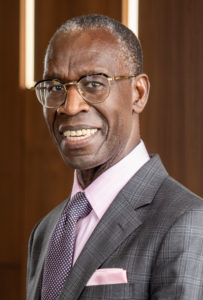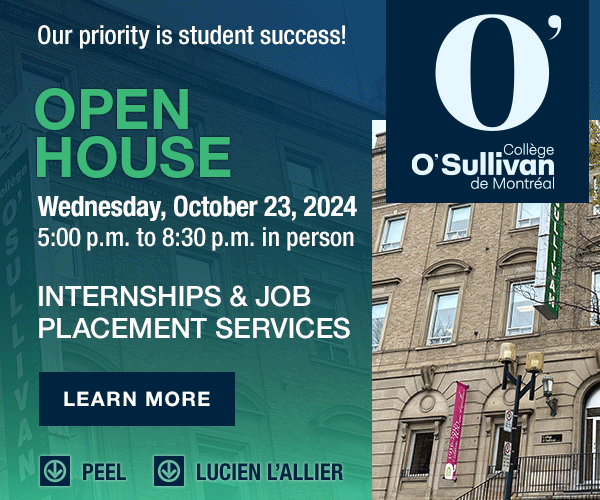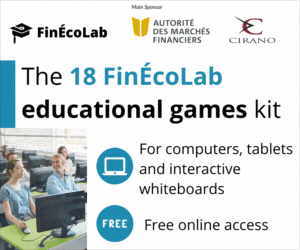By Debora Van Brenk

Opiyo Oloya is Western's inaugural associate vice-president of equity, diversity and inclusion. Photo by Frank Neufeld, Special to Western Communications
Western is launching an online equity census intended to build a more inclusive culture for students, faculty and staff.
The demographic data survey is the next step in a strategy to embed policies, processes and practices of equity, diversity, inclusion and decolonization (EDI-D) into the fabric of Western, said Opiyo Oloya, the university's new associate vice-president of EDI.
The intent is far more than number-crunching, and gets to the heart of identity and equity, said Oloya.
"The information will help tell us where we are, and who we are - and inform where we should be going, and who we should be becoming."
Oloya led a webinar on October 6 to share his vision for leading change and building a more inclusive culture for students, faculty, staff and graduates as one way to fulfil the aims of Western's new strategic plan, Towards Western at 150. The full, recorded session of the webinar can be found here.
The Western we deserve'
Oloya took webinar listeners on a journey through his early life, to the pivotal day when, in post-Idi Amin Uganda, he lay in front of a military vehicle to persuade soldiers to save the lives of a woman and her two children who were being attacked. That moment, he said, is when he discovered his voice for justice.
"So for me, EDI-D isn't a bunch of abstract ideas expressing some future utopia. No, not at all. Rather EDI-D is what we must practise every day in our interaction with each other in this space called Western. In my vision of an inclusive Western, all voices are invited and welcome. In the Western we deserve, we intentionally seek out diverse voices to participate in building an inclusive space.
"The Western we deserve is tolerant, accepting and inclusive."
Western News recently sat down with Oloya, who shared additional insights into EDI-D at Western - including a moving conversation with Indigenous elders, his pride in students who rallied against sexual and gender-based violence, and what it's been like to live in student residence.
Western News: What do you hope to learn from this new equity census and what are the next steps?
Opiyo Oloya: This is the first time that Western has undertaken a massive census that takes note of faculty, staff and student diversity. We're using the tag Raise Your Voice because it's my belief that it is in listening to the many voices at Western that we are going to begin to see change. Then we can begin to see: how do we expand, how do we add to these voices, how do we invite more people to Western? The census really is an opportunity to give us a profile of Western and to use that profile as a stepping stone.
WN: What's the next step after collecting information?
Oloya: Number one, the information will only ever reported in grouped form so that the community can feel safe in responding. The information has many layers of safeguards and is used for planning purposes.
Two, that information will help us to determine what our EDI strategic plan will look like - how we create a space that is welcoming, safe, inclusive, diversified - and it will be based on the data. The data will tell us where we are and where we should be going. Thirdly, it provides a baseline measurement so that, in one or two years' time, we can know if we have made a difference, if we are making progress.
It is about more than numbers, because culture is more than just numbers. It is really about creating an inclusive space where we are accepting of all people, we are accepting of all cultural backgrounds, welcoming of all voices.
WN: Can you give me an example of how you envision that happening?
Oloya: When we talk about decolonization, it is also about the language we use. It is about the way we teach, the way we learn and what we are learning, the atmosphere that is being created so that there is none of this hierarchical sense that some people are better than others.
Before I started here, one of the first things I did was reach out to Dr. Christy Bressette [vice-provost and associate vice-president, Indigenous Initiatives] and I told her, I have been appointed to this position, but I do not know how I can begin this work without first acknowledging the Office of Indigenous Initiatives.' And so, on July 30, I met with Dr. Bressette at Walpole Island First Nation and she said, Come, let us go and meet the elders.'
They welcomed me with a gift of sweetgrass and a smudging ceremony, and then we had an opportunity to talk. We discovered some cultural things in common between the Indigenous people and my own background in Northern Uganda, including our mutual belief in the importance that the natural world plays in the lives of people.
Our conversation lasted for 30 minutes and then another 30 minutes - and three hours later we were having lunch and still talking. And so, for me, the beginning of my work felt right, because of that support that I had from the Indigenous community, from Dr. Bressette and from the elders.
Recognizing that Western brings people from different backgrounds, I will suggest to you they were touched by colonization in one way or another, whether it happened here in Canada, Africa, Asia, the Caribbean or the Indo-Pacific. Decolonization goes beyond pertaining only to Indigenous people, and is all-embracing for every one of us.
WN: You've been at Western as AVP-EDI for a little more than a month now. What has surprised you the most in your work here so far?
Oloya: There's eagerness to embrace the idea of change. People really are serious about it. I'm sure I will find some resistance at some point about something, but I think what we are talking about here is that there is an opportunity for goodwill to germinate. We can grow and make Western a more embracing, welcoming space for everyone - Indigenous, people of colour, LGBTQ2+, people with disabilities, everyone - so that they all feel that this is a place for them.
WN: What insights would you hope to provide to someone who is just starting on that journey towards building equity and justice?
Oloya: I believe a big part of it is being open to learning. At the end of it, really, if people are open to new ideas, to new learning, I think that is how we are going to move. We all learn together, we all learn how to deal with each other, to really listen and see that everybody is bringing something that contributes to the character that is Western.
WN: How do we talk to, or listen to, people who have faced the deep pain of racism, discrimination and exclusion?
Oloya: We have to listen to these difficult stories, pay attention to what people are telling us, and listen with our heart and ears. These are real stories of real lives experienced by real people. When people don't have opportunity to tell their stories or feel that they are being invited to tell their stories but nobody's actively listening, then it is just a token.
The next thing is to ask ourselves, What are the actions required of us to make things better?' It may be something as small as forming a survivors' circle. It may be saying, This happened to you and the following processes were not available,' so let's begin to look at creating those processes, maybe not for this one person who was wounded, but for the next person.
WN: In a world that seems increasingly polarized on many issues, how do you stay optimistic that there is opportunity to find common ground?
Oloya: Oh, I have a lot of optimism. Two examples:
The first one was the walkout last month. The stories these young survivors of sexual violence were telling were difficult to hear but it was important to listen. For me, deep inside me, what gave me the most pride was that they were speaking - and that thousands of people on UC Hill were listening to what they had to say. That, to me, is how you begin change. Because in those voices, we heard pain but we also heard teaching - teaching how people can relate to each other.
The second was on September 30, when we had the National Day of Truth and Reconciliation, and we were able to hear stories about residential school survivors and those who did not survive, and we participated in the ceremonies that were organized by the Office of Indigenous Initiatives. That this event was happening on campus at Western and that senior leadership and administration at Western were there to be part of it - that gives me hope.
I feel very hopeful. I think that together, we are going to walk this walk; we will make changes. And yes, it may not be giant leaps. But every step is a step towards the journey of 1,000 miles. It starts with a step.
WN: You're living in residence right now, side by side with students. What has that experience been like?
Oloya: It's one place I get to talk to students every day and I'm very proud of them. I can already see they are coming together. Young men, young women, people of colour, Black students: they're all there doing their homework and studying together. But they are constantly working together, constantly laughing together. I haven't seen or heard any conflict. To me, that is where we want to be.
This conversation with Opiyo Oloya has been slightly edited for brevity and clarity













